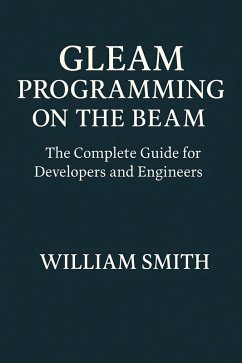
The Actor Model in Distributed Computing (eBook, ePUB)
Definitive Reference for Developers and Engineers

PAYBACK Punkte
0 °P sammeln!
"The Actor Model in Distributed Computing" "The Actor Model in Distributed Computing" is a comprehensive and authoritative exploration of one of the most influential paradigms in concurrent and distributed systems. This book meticulously traces the theoretical foundations and evolution of the actor model, contrasting its core concepts-such as encapsulated state and asynchronous messaging-with alternative concurrency approaches like shared memory and process calculi. Through clear exposition, readers are empowered to grasp the model's intrinsic expressiveness, modularity, and the contexts in wh...
"The Actor Model in Distributed Computing" "The Actor Model in Distributed Computing" is a comprehensive and authoritative exploration of one of the most influential paradigms in concurrent and distributed systems. This book meticulously traces the theoretical foundations and evolution of the actor model, contrasting its core concepts-such as encapsulated state and asynchronous messaging-with alternative concurrency approaches like shared memory and process calculi. Through clear exposition, readers are empowered to grasp the model's intrinsic expressiveness, modularity, and the contexts in which it excels, while becoming aware of its practical limitations. Delving beyond fundamentals, the book offers an in-depth examination of engineering robust actor-based systems. It details essential programming constructs and architectural patterns, from actor creation, supervision, and message queuing, to sophisticated mechanisms for distribution transparency, state migration, and fault tolerance in large-scale deployments. Topics such as scheduling, load balancing, system optimization, and the unique challenges of memory and resource management are handled with both breadth and technical rigor, making the work an invaluable resource for practitioners and architects seeking to maximize reliability and performance. "The Actor Model in Distributed Computing" stands out for its practical guidance and broad ecosystem coverage. Readers will find comparative reviews of leading actor frameworks-including Erlang, Akka, and Orleans-alongside security best practices, formal verification techniques, and recipes for testing and monitoring distributed actor systems. The closing chapters illuminate advanced topics and current research frontiers, like distributed transactions, cloud-native deployments, and the future of actors in edge and serverless computing. With its blend of foundational theory and pragmatic design-oriented insight, this book is essential reading for anyone building next-generation distributed applications.
Dieser Download kann aus rechtlichen Gründen nur mit Rechnungsadresse in A, B, BG, CY, CZ, D, DK, EW, E, FIN, F, GR, H, IRL, I, LT, L, LR, M, NL, PL, P, R, S, SLO, SK ausgeliefert werden.













